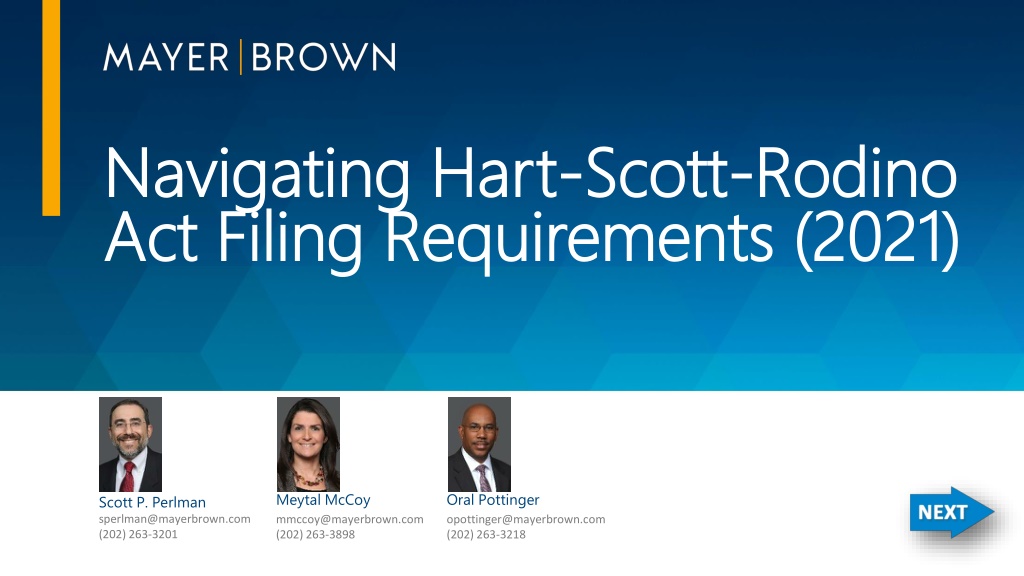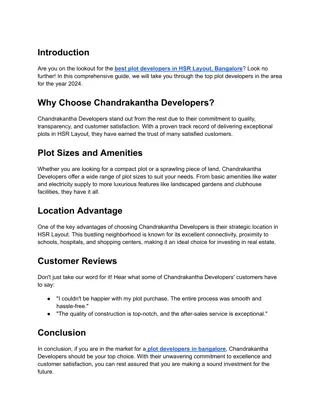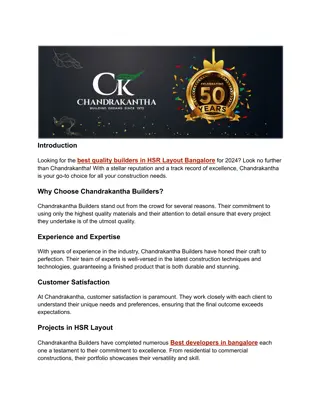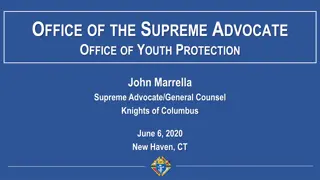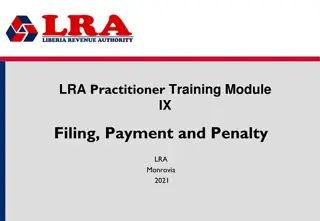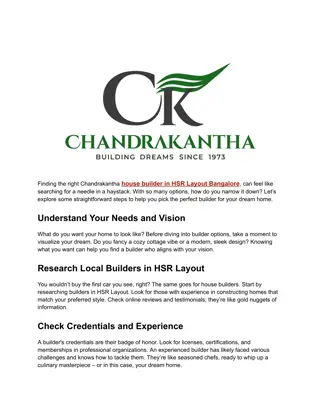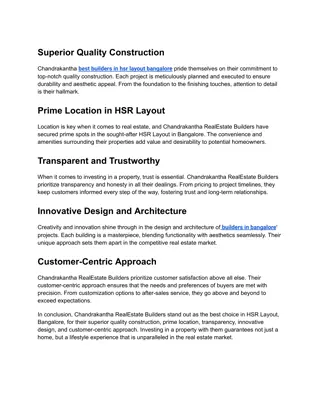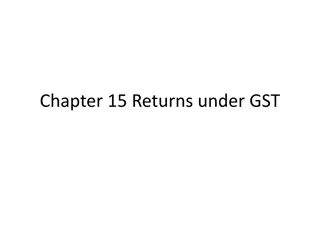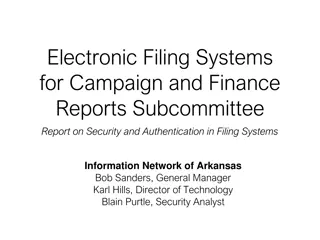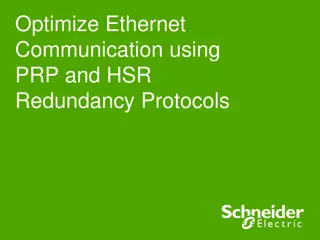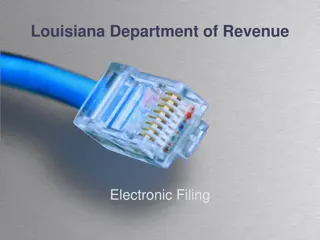Understanding HSR Filing Requirements and Process
This resource provides guidance on the Hart-Scott-Rodino (HSR) Act filing requirements and process for companies engaging in reportable transactions. It covers HSR overview, transaction types, valuation of voting securities, and contact information for legal counsel. The guide emphasizes the importance of compliance with HSR regulations and offers insights into exemptions and statutory waiting periods. Contact Scott Perlman, Meytal McCoy, or Oral Pottinger for additional information or queries.
Download Presentation

Please find below an Image/Link to download the presentation.
The content on the website is provided AS IS for your information and personal use only. It may not be sold, licensed, or shared on other websites without obtaining consent from the author. Download presentation by click this link. If you encounter any issues during the download, it is possible that the publisher has removed the file from their server.
E N D
Presentation Transcript
Navigating Hart Navigating Hart- -Scott Act Filing Requirements (2021) Act Filing Requirements (2021) Scott- -Rodino Rodino next.png Meytal McCoy mmccoy@mayerbrown.com (202) 263-3898 Oral Pottinger opottinger@mayerbrown.com (202) 263-3218 Scott P. Perlman sperlman@mayerbrown.com (202) 263-3201
Introduction This guide was developed to help companies understand the basics of the HSR process. To advance through the guide, answer the question on the screen by clicking on the appropriate hyperlinked object or by clicking the Next button at the bottom. To return to this initial screen at any point, click the Start Over button on the bottom. This resource is for general informational purposes only. It should not be construed as legal advice, nor should it be used as a substitute for legal counsel. If you need any additional information or have any questions regarding the HSR filing process, please contact Scott Perlman (sperlman@mayerbrown.com; 202-263- 3201), Meytal McCoy (mmccoy@mayerbrown.com; 202-263-3898), or Oral Pottinger (opottinger@mayerbrown.com; 202-263-3218). next.png
HSR Overview Generally, a transaction is reportable if the size-of-the-transaction test is met: Is the value of what s being acquired greater than $368M? If yes, the deal is reportable unless an exemption applies. If not, and the value of what s being acquired is greater than $92M but less than $368M, then the size-of-the-person test also must be met for the deal to be reportable. Size-of-the-person test: One party must have $18.4M in net sales or total assets; and another party must have $184M in net sales or total assets. If the value of what s being acquired is less than $92M, then an HSR filing is not required. A transaction can involve the acquisition of: (a) voting securities (the right to vote for the board of directors of an issuer); (b) assets; (c) non-corporate interests (LLC or LLP units); or (d) a combination thereof. Even if a transaction meets the HSR thresholds, one or more HSR exemptions may apply (explained in more detail in this presentation). If a transaction is reportable, a filing must be submitted to each of the FTC/DOJ, and the parties must abide by a 30-day statutory waiting period before they can close. The waiting period can be terminated early under certain circumstances.
What does your transaction involve? Acquisition of Voting Securities Acquisition of Voting Securities Acquisition of Assets Acquisition of Assets Acquisition of Non-Corporate Interests (LLCs, LLPs, etc.) Acquisition of Non-Corporate Interests (LLCs, LLPs, etc.) Formation of a Corporation Formation of a Corporation
Valuing Voting Securities A deal involving the acquisition of voting securities reportable if the size-of-the-transaction test is met. For these kinds of deals, the size-of-the-transaction test is based on: (1) the value of the voting securities that are being acquired; PLUS (2) the value of any voting securities already held. Answer these questions to determine if the size-of-the-transaction test in this kind of deal: Are the Voting Securities Publicly Traded? tes.png no.png START OVER.png
Valuing Voting Securities Has the Price Been Set by Agreement? tes.png no.png START OVER.png
Valuing Voting Securities The Value Is the Greater of the Market Price or the Agreed Upon Price START OVER.png next.png
Valuing Voting Securities The Value Is the Market Price START OVER.png next.png
Valuing Voting Securities The Value Is the Agreed Upon Price START OVER.png next.png
Valuing Voting Securities The Value Is the Fair Market Value of the Voting Securities START OVER.png next.png
Is an HSR Filing Required? Add the value of any voting securities already held to the value of the voting securities being acquired (CALCULATION HELP) Total Value Exceeds $368 Million? Total Value Exceeds $368 Million? Total Value Is Less Than or Equal to $368 Million and More Than $92 Million? Total Value Is Less Than or Equal to $368 Million and More Than $92 Million? START OVER.png Total Value Is $92 Million or Less? Total Value Is $92 Million or Less?
Calculating the Value of Voting Securities Already Held To calculate the value of voting securities already held, first determine if the voting securities are publicly traded. Publicly traded voting securities that were held prior to the current transaction are valued at the publicly traded market price. Non-publicly traded voting securities that were held prior to the current transaction are valued at fair market value. START OVER.png next.png
Is an HSR Filing Required? An HSR Filing Is Required Unless an Exemption Applies START OVER.png next.png
Is an HSR Filing Required? An HSR Filing Is Required If the Size-of-the-Persons Test Is Met START OVER.png next.png
Is an HSR Filing Required? No HSR Filing Is Required START OVER.png
Valuing Assets If your transaction involves the acquisition of assets, the first step is to determine if the size-of- the-transaction test is met. This test is based on: (1) the value of the assets that will be acquired; PLUS (2) the value of any assets acquired from the same company within the last 180 days. Answer these questions to determine whether the acquisition of assets could be reportable under HSR. Is the Acquisition Price Set by Agreement? tes.png no.png START OVER.png
Valuing Assets purple triangle.png The Value Is the Greater of the Acquisition Price or the Fair Market Value of the Assets The Value Is the Greater of the Acquisition Price or the Fair Market Value of the Assets START OVER.png next.png
Valuing Assets If the Acquisition Price Isn t Set by the Agreement, or if Acquisition Price Is Uncertain (e.g., because Future Payments Are Based on Performance), then the Value of the Assets Is Their Fair Market Value START OVER.png next.png
Valuing Assets To determine the acquisition price: Start with the consideration being paid; and Add the value of any accrued liabilities of the Target that will be assumed by the Buyer; and Add the value of any assets that the Buyer has acquired from the Target or for which the Buyer has entered into an LOI/agreement in principle to acquire within the last 180 days. The fair market value must be determined in good faith by the board of directors of the Buyer or by a designee of the Buyer s BOD; any reasonable method can be used (e.g., discounted cash flow). START OVER.png next.png
Is an HSR Filing Required? Total Value of the Assets Exceeds $368 Million? Total Value of the Assets Exceeds $368 Million? Total Value of the Assets Is Less Than or Equal to $368 Million and More Than $92 Million? Total Value of the Assets Is Less Than or Equal to $368 Million and More Than $92 Million? Total Value of the Assets Is $92 Million or Less? Total Value of the Assets Is $92 Million or Less? START OVER.png
Valuing Non-Corporate Interests (LLCs, LLPs, etc.) If your transaction involves the acquisition of non-corporate interests, the first step is to determine if the size-of-the- transaction test is met. This test is based on: (1) the value of the non-corporate interests that will be acquired; PLUS (2) the value of any non-corporate interests already held. Answer these questions to determine whether the acquisition of non-corporate interests could be reportable under HSR. Will One Buyer Acquire a Controlling Interest (50% or Greater) in the Non-Corporate Entity? tes.png no.png START OVER.png
If the Buyer Will Acquire a Controlling Interest in the Non-Corporate Entity: Does the Agreement Set the Price for the Non-Corporate Interests Being Acquired? tes.png no.png START OVER.png
If the Buyer Will Not Acquire a Controlling Interest in the Non-Corporate Entity: An HSR Filing Is Not Required START OVER.png
If the Agreement Sets the Price for the Non- Corporate Interests Being Acquired: The Value Is the Agreed Upon Price START OVER.png next.png
If the Agreement Does Not Set the Price for the Non-Corporate Interests Being Acquired: The Value Is the Fair Market Value of the Non- Corporate Interests START OVER.png next.png
Is an HSR Filing Required? Add the fair market value of any non-corporate interests already held by the Buyer to the value of any non-corporate interests being acquired: Total Value Exceeds $368 Million? Total Value Exceeds $368 Million? Total Value Is Less Than or Equal to $368 Million and More Than $92 Million? Total Value Is Less Than or Equal to $368 Million and More Than $92 Million? START OVER.png Total Value Is $92 Million or Less? Total Value Is $92 Million or Less?
Is an HSR Filing Required? An HSR Filing Is Required Unless an Exemption Applies START OVER.png next.png
Is an HSR Filing Required? purple triangle.png HSR Filing Is Required If the Size-of-the-Persons Test Is Met HSR Filing Is Required If the Size-of-the-Persons Test Is Met START OVER.png next.png
Is an HSR Filing Required? An HSR Filing Is Not Required START OVER.png
The Size-of-the-Persons Test Based on Fully Consolidated Financials, Does One Party Have Total Assets or Annual Net Sales of $184 Million or More and Does Another Party Have Total Assets or Annual Net Sales of $18.4 Million or More? tes.png no.png START OVER.png
Is the Size-of-the-Persons Test Met? The Size-of- the-Persons Test Is Met, and an HSR Filing Is Required Unless an Exemption Applies START OVER.png next.png
The Size-of-the-Persons Test Is the Target Engaged in Manufacturing? tes.png no.png START OVER.png
Is the Size-of-the-Persons Test Met? The Size-of-the-Persons Test Is Met, and an HSR Filing Is Required Unless an Exemption Applies START OVER.png
Is the Size-of-the-Persons Test Met? The Size-of-the-Persons Test Is Not Met; An HSR Filing Is Not Required START OVER.png
If the Target Is Engaged in Manufacturing: Based on Fully Consolidated Financials, Does the Target Have Total Assets or Annual Net Sales of $18.4 Million or More and Does the Buyer Have Total Assets or Annual Net Sales of $184 Million or More? tes.png no.png START OVER.png
If the Acquired Person Is Not Engaged in Manufacturing: Based on Fully Consolidated Financials, Does the Target Have Total Assets of $18.4 Million or More* and Does the Buyer Have Total Assets or Annual Net Sales of $184 Million or More? * Unlike When a Target Is Engaged in Manufacturing, for This Assessment, You Only Need to Consider the Target s Total Assets, Not Total Assets or Annual Net Sales. Based on Fully Consolidated Financials, Does the Target Have Total Assets of $18.4 Million or More* and Does the Buyer Have Total Assets or Annual Net Sales of $184 Million or More? * Unlike When a Target Is Engaged in Manufacturing, for This Assessment, You Only Need to Consider the Target s Total Assets, Not Total Assets or Annual Net Sales. tes.png no.png START OVER.png
Is the Size-of-the-Persons Test Met? purple triangle.png The Size-of-the-Persons Test Is Met, and an HSR Filing Is Required Unless an Exemption Applies The Size-of-the-Persons Test Is Met, and an HSR Filing Is Required Unless an Exemption Applies START OVER.png next.png
Is the Size-of-the-Persons Test Met? The Size-of-the-Persons Test Is Not Met; An HSR Filing Is Not Required START OVER.png
Forming Corporations: Applying the Size-of-the-Persons Test DOES: The Buyer Have Annual Net Sales of $18.4 Million or More; The Newly Formed Corporation Have Total Assets of $184 Million or More (CALCULATION HELP); and At Least One of the Buyers Have Annual Net Sales or Total Assets of $18.4 Million or More? The Buyer Have Annual Net Sales of $18.4 Million or More; The Newly Formed Corporation Have Total Assets of $184 Million or More (CALCULATION HELP); and At Least One of the Buyers Have Annual Net Sales or Total Assets of $18.4 Million or More? tes.png no.png START OVER.png
Calculating the Total Assets of the Newly Formed Corporation To calculate the total assets of newly formed corporation, include: (1) All of the assets that the parties have agreed to contribute; and (2) Any amount of credit of the newly formed corporation that any contributing party has agreed to extend or guarantee. START OVER.png next.png
Is an HSR Filing Required? An HSR Filing Is Required Unless an Exemption Applies START OVER.png next.png
Forming Corporations: Applying the Size-of-the-Persons Test DOES: The Buyer Have Annual Net Sales or Total Assets of $184 Million or More; The Newly Formed Corporation Have Total Assets of $18.4 Million or More (CALCULATION HELP); and At Least One of the Buyers Have Annual Net Sales or Total Assets of $18.4 Million or More? START OVER.png
Calculating the Total Assets of the Newly Formed Corporation To calculate the total assets of newly formed corporation, include: (1) All of the assets that the parties have agreed to contribute; and (2) Any amount of credit of the newly formed corporation that any contributing party has agreed to extend or guarantee. START OVER.png next.png
Is an HSR Filing Required? An HSR Filing Is Not Required START OVER.png
Commonly Used HSR Exemptions 802.1 Ordinary Course Exemptions Exempts certain acquisitions made in the ordinary course of business Covers acquisitions of new goods, current supplies, and used durable goods in certain situations (e.g., certain leased used durable goods), and acquisitions relating to certain outsourcing transactions Does not apply if the Target is selling all the of the assets of an operating unit START OVER.png next.png
Commonly Used HSR Exemptions 802.2 Certain Acquisitions of Real Property Exempts certain acquisitions of: New or Used Facilities Unproductive Real Property Office and Residential Property Hotels and Motels Does not include casinos or management companies that manage third-party properties Recreational Land Agricultural Property Retail Rental Space and Warehouses Any non-exempt assets being acquired still may be reportable if the value exceeds HSR thresholds. START OVER.png next.png
Commonly Used HSR Exemptions 802.3 Acquisitions of Carbon-Based Mineral Reserves Exempts acquisitions of oil reserves, natural gas, shale or tar sands, or the rights thereto, valued at $500 million or less Also exempts acquisitions of reserves of coal, or rights thereto, valued at $200 million or less Includes associated exploration and production assets Any non-exempt assets being acquired still may be reportable if the value exceeds HSR thresholds START OVER.png next.png
Commonly Used HSR Exemptions 802.4 Acquisition of Entities that Hold Exempt Assets Exempts the acquisition of voting securities or controlling interests in non-corporate entities if the underlying entity only holds assets that are otherwise exempt from HSR Any non-exempt assets being acquired still may be reportable if the value exceeds HSR thresholds. START OVER.png next.png
Commonly Used HSR Exemptions 802.9 Acquisitions Solely for the Purpose of Investment Exempts passive investments in corporations, regardless of dollar amount, if the Buyer will hold 10% or less of the corporation Does not apply if the Buyer takes actions that are inconsistent with a passive-only intent, such as: Nominating a candidate for the board of directors Proposing corporate action requiring shareholder approval Having a controlling shareholder, director, officer, or employee simultaneously serving as an officer or director of the Target Being a competitor of the Target Having stand-alone business dealings with the Target, regardless of whether such dealings are horizontal or vertical next.png START OVER.png
Commonly Used HSR Exemptions 802.50 Acquisition of Foreign Assets Exempts the acquisition of assets located outside of the U.S. if: Sales into the U.S. attributable to those assets were $92 million or less in the Target s most recent fiscal year; or Both the Buyer and Target are foreign, the aggregate sales of the Buyer and Target in or into the U.S. are less than $202.4 million in their respective most recent fiscal years, the aggregate total assets of the Buyer and the Target located in the U.S. have a fair market value of less than $202.4 million, and the transaction value does not exceed $368 million next.png START OVER.png
